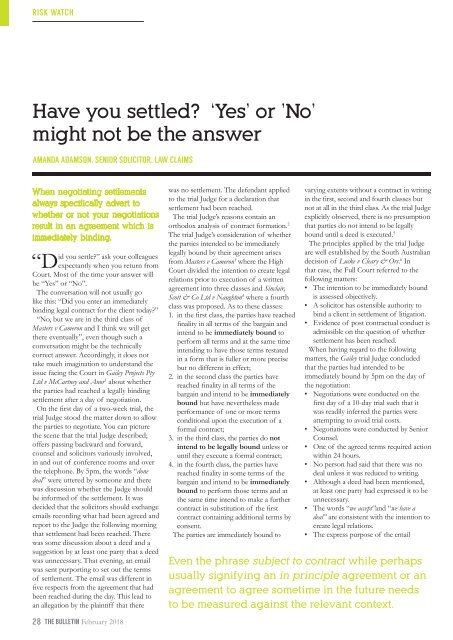LSB February 2018_Web_LSSA
You also want an ePaper? Increase the reach of your titles
YUMPU automatically turns print PDFs into web optimized ePapers that Google loves.
RISK WATCH<br />
Have you settled? ‘Yes’ or ’No’<br />
might not be the answer<br />
AMANDA ADAMSON, SENIOR SOLICITOR, LAW CLAIMS<br />
When negotiating settlements<br />
always specifically advert to<br />
whether or not your negotiations<br />
result in an agreement which is<br />
immediately binding.<br />
id you settle?” ask your colleagues<br />
“Dexpectantly when you return from<br />
Court. Most of the time your answer will<br />
be “Yes” or “No”.<br />
The conversation will not usually go<br />
like this: “Did you enter an immediately<br />
binding legal contract for the client today?”<br />
“No, but we are in the third class of<br />
Masters v Cameron and I think we will get<br />
there eventually”, even though such a<br />
conversation might be the technically<br />
correct answer. Accordingly, it does not<br />
take much imagination to understand the<br />
issue facing the Court in Gailey Projects Pty<br />
Ltd v McCartney and Anor 1 about whether<br />
the parties had reached a legally binding<br />
settlement after a day of negotiation.<br />
On the first day of a two-week trial, the<br />
trial Judge stood the matter down to allow<br />
the parties to negotiate. You can picture<br />
the scene that the trial Judge described;<br />
offers passing backward and forward,<br />
counsel and solicitors variously involved,<br />
in and out of conference rooms and over<br />
the telephone. By 5pm, the words “done<br />
deal” were uttered by someone and there<br />
was discussion whether the Judge should<br />
be informed of the settlement. It was<br />
decided that the solicitors should exchange<br />
emails recording what had been agreed and<br />
report to the Judge the following morning<br />
that settlement had been reached. There<br />
was some discussion about a deed and a<br />
suggestion by at least one party that a deed<br />
was unnecessary. That evening, an email<br />
was sent purporting to set out the terms<br />
of settlement. The email was different in<br />
five respects from the agreement that had<br />
been reached during the day. This lead to<br />
an allegation by the plaintiff that there<br />
28 THE BULLETIN <strong>February</strong> <strong>2018</strong><br />
was no settlement. The defendant applied<br />
to the trial Judge for a declaration that<br />
settlement had been reached.<br />
The trial Judge’s reasons contain an<br />
orthodox analysis of contract formation. 2<br />
The trial Judge’s consideration of whether<br />
the parties intended to be immediately<br />
legally bound by their agreement arises<br />
from Masters v Cameron 3 where the High<br />
Court divided the intention to create legal<br />
relations prior to execution of a written<br />
agreement into three classes and Sinclair,<br />
Scott & Co Ltd v Naughton 4 where a fourth<br />
class was proposed. As to these classes:<br />
1. in the first class, the parties have reached<br />
finality in all terms of the bargain and<br />
intend to be immediately bound to<br />
perform all terms and at the same time<br />
intending to have those terms restated<br />
in a form that is fuller or more precise<br />
but no different in effect;<br />
2. in the second class the parties have<br />
reached finality in all terms of the<br />
bargain and intend to be immediately<br />
bound but have nevertheless made<br />
performance of one or more terms<br />
conditional upon the execution of a<br />
formal contract;<br />
3. in the third class, the parties do not<br />
intend to be legally bound unless or<br />
until they execute a formal contract;<br />
4. in the fourth class, the parties have<br />
reached finality in some terms of the<br />
bargain and intend to be immediately<br />
bound to perform those terms and at<br />
the same time intend to make a further<br />
contract in substitution of the first<br />
contract containing additional terms by<br />
consent.<br />
The parties are immediately bound to<br />
varying extents without a contract in writing<br />
in the first, second and fourth classes but<br />
not at all in the third class. As the trial Judge<br />
explicitly observed, there is no presumption<br />
that parties do not intend to be legally<br />
bound until a deed is executed. 5<br />
The principles applied by the trial Judge<br />
are well established by the South Australian<br />
decision of Lucke v Cleary & Ors. 6 In<br />
that case, the Full Court referred to the<br />
following matters:<br />
• The intention to be immediately bound<br />
is assessed objectively.<br />
• A solicitor has ostensible authority to<br />
bind a client in settlement of litigation.<br />
• Evidence of post contractual conduct is<br />
admissible on the question of whether<br />
settlement has been reached.<br />
When having regard to the following<br />
matters, the Gailey trial Judge concluded<br />
that the parties had intended to be<br />
immediately bound by 5pm on the day of<br />
the negotiation:<br />
• Negotiations were conducted on the<br />
first day of a 10-day trial such that it<br />
was readily inferred the parties were<br />
attempting to avoid trial costs.<br />
• Negotiations were conducted by Senior<br />
Counsel.<br />
• One of the agreed terms required action<br />
within 24 hours.<br />
• No person had said that there was no<br />
deal unless it was reduced to writing.<br />
• Although a deed had been mentioned,<br />
at least one party had expressed it to be<br />
unnecessary.<br />
• The words “we accept”and “we have a<br />
deal” are consistent with the intention to<br />
create legal relations.<br />
• The express purpose of the email<br />
Even the phrase subject to contract while perhaps<br />
usually signifying an in principle agreement or an<br />
agreement to agree sometime in the future needs<br />
to be measured against the relevant context.


















